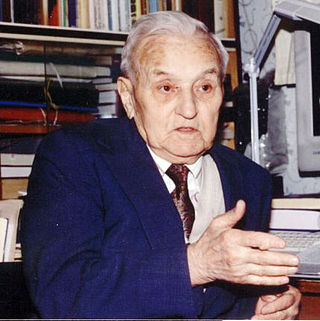Top Qs
Timeline
Chat
Perspective
Vasyl Kuk
Ukrainian nationalist activist and militant (1913–2007) From Wikipedia, the free encyclopedia
Remove ads
Vasyl Stepanovych Kuk (Ukrainian: Василь Степанович Кук; 11 January 1913 – 9 September 2007) was a Ukrainian nationalist activist and militant who was the last leader of the Ukrainian Insurgent Army, following the death of Roman Shukhevych. In 1954, he was captured by Soviet KGB troops and spent six years in prison without a court sentence.
This article needs additional citations for verification. (October 2023) |
Remove ads
Biography
Summarize
Perspective
Vasyl Stepanovych Kuk was born in the village of Krasne in Austria-Hungary (now in Lviv Oblast, Ukraine) on 11 January 1913 to a family of railway workers.[1] He was baptised in the Ukrainian Greek Catholic Church five days after his birth.[2] Kuk was a gymnasium student in the city of Zolochiv, and he later studied law at the Catholic University of Lublin. There, Kuk became active in several Ukrainian youth organisations, such as Plast, Sokil and Prosvita.[3]
Kuk joined the Organisation of Ukrainian Nationalists, a militant Ukrainian nationalist group, in 1929.[1] In 1937 he went underground to escape the Polish police. In 1941, he became one of the OUN-B's leaders. During World War II, he headed an OUN-organized anti-Nazi underground in Dnipropetrovsk Ukrainian Soviet Socialist Republic (now Dnipro, Ukraine) from 1942 to 1943, before returning to western Ukraine.[citation needed] He led the People's Revolutionary Liberation Organisation, a socialist organ of the Ukrainian Insurgent Army (UPA) in Volhynia, as well as the UPA's Southern Operational Group.[4]
After leader Roman Shukhevych's death in 1950, Kuk assumed the role of commander of the UPA and of the OUN in Ukraine. Kuk was captured by Soviet forces in 1954. After six years of imprisonment and interrogation, he was amnestied and allowed to move to Kyiv. After obtaining a philosophy degree from University of Kyiv, he worked at Institute of History of the Academy of Sciences of the Ukrainian SSR before his eventual dismissal as an undesirable following the publication of his book Marxism-Leninism about the Ukrainian National Question. In the 1990s he became active in UPA veteran affairs.
Remove ads
Statement to the Ukrainians
In 1960, Vasyl Kuk wrote an open letter.[5] He directed his statement to the Ukrainians living outside the Soviet Union. Kuk read his letter over the Soviet radio on 19 September 1960. His letter was then reprinted by the Soviet press and eventually by the newspapers in the US and Canada.
In the letter, Kuk admits his anti-Bolshevik activity before, during, and after World War II, partly explaining it with his own "misguidance" and partly deploring it. Next, he states that he had been arrested, but later released by decree of the Supreme Council of the Ukrainian SSR and now, along with his wife, is a "free citizen of the Ukrainian SSR."
The main part of the letter is devoted to the proof that there is no longer any need for underground resistance in Ukraine and that rebellion against Communism is synonymous with the rebellion against the Ukrainian nation. Kuk stated that although it may be true that in the times of the "personality cult" of Stalin the conditions were not too favorable, but not really as bad, as the nationalists indicate and now under Nikita Khrushchev things are truly fine and if you do not believe it then "come and see for yourself."
Remove ads
Death and burial
Kuk died on 9 September 2007, in his apartment in Kyiv. His funeral was held in Kyiv at the Kyiv City Teacher's House before his body was transported to Lviv, where the funeral service continued. Kuk was buried in Krasne.[6]
References
External links
Wikiwand - on
Seamless Wikipedia browsing. On steroids.
Remove ads

